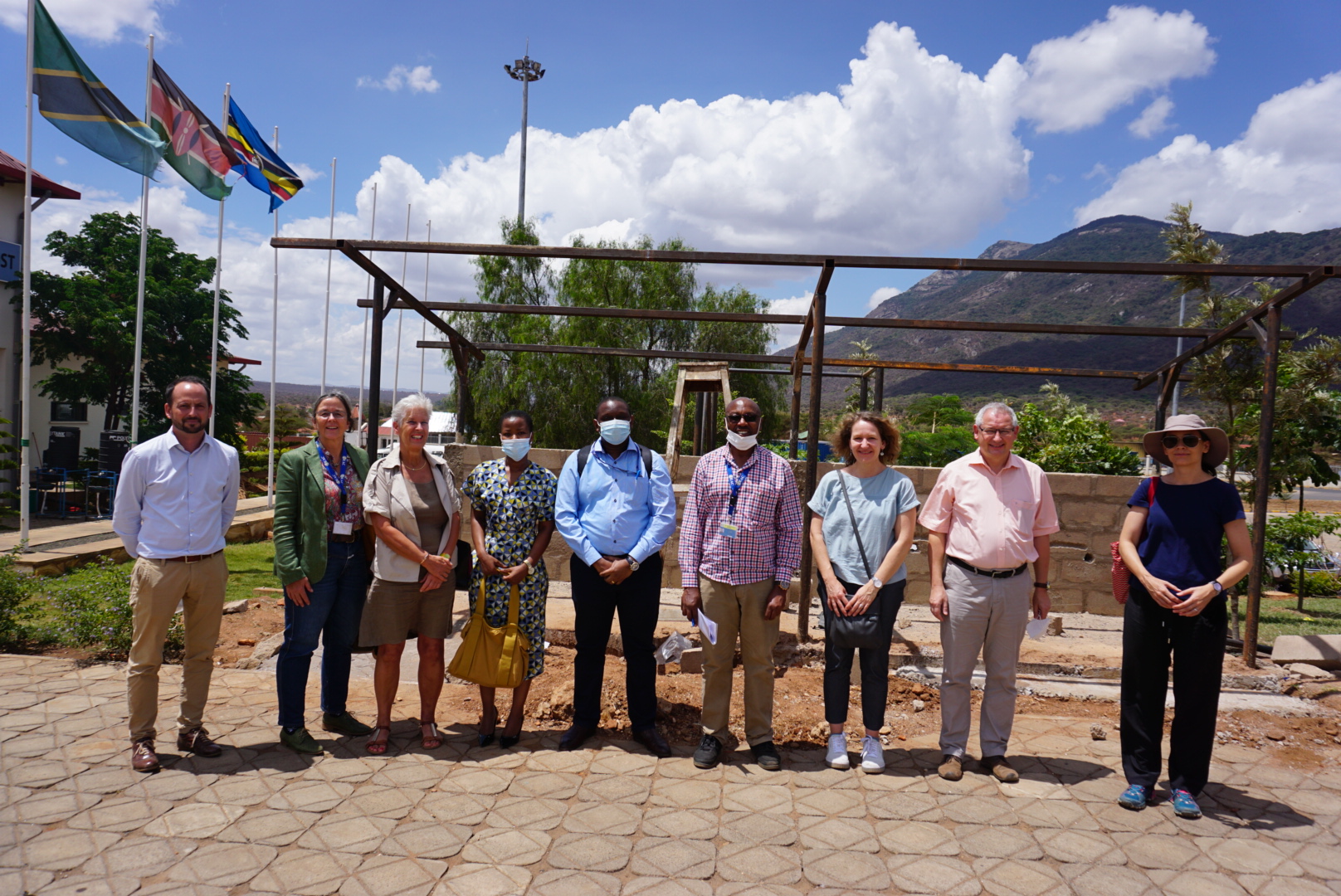
Border staff see benefits from infection prevention training
East African Community Headquarters, Arusha, Tanzania, 23 November 2021. A training of trainers (ToT) programme targeting border posts staff on COVID-19 preparedness and response was very beneficial. This is the testimony of participants of the training when they met a delegation of German officials at Namanga on the Kenya and Tanzania border recently. The 2-day trainings were offered over a period of 12 weeks from September 2020.
The visiting officials included Claudia Imwolde-Kraemer from the German Ministry for Economic Cooperation and Development (BMZ); Jennifer Wörl and Dr. Ralf Orlik, German Development Bank (KfW), and Johannes Sperrfechter from the German Embassy in Tanzania. They talked to Peter Ndichu and Frank Okwema who are beneficiaries of the ToT that aimed at enhancing the capacity of staff for infection prevention and for communicating the COVID-related risks to travellers that include thousands of EAC citizens and tourists.
“We benefitted and did a lot of capacity building. In addition to passing the knowledge to colleagues, we also trained other people. We have organized meetings with subcounty teams and VHTs (village health teams) and trained them,” Frank Okwema, a laboratory expert from a mobile laboratory stationed at Namanga said.
“Normally we handle travellers and receive cash for visas. This exposes us to COVID-19. We were trained for instance on social distancing, contamination and disposal of contaminated items. So we use the knowledge from the training to guide colleagues and travellers on how they can protect themselves and protect others,” according to Peter Ndichu, Immigration Officer at Namanga One Stop Border Post (OSBP).
Border Posts are high-risk areas regarding the spread of COVID-19 and other infectious diseases from one country to another. These “Points of Entry” are at the centre of movement of people, animals and goods from one country to another.
“The way we used to do waste management in the past is quite different from what we do after the training. Now we even know the required concentration of the chemicals that we need to use for sanitization,” Frank Okwema added.
The EAC Secretariat with support from the German Government through the Deutsche Gesellschaft für Internationale Zusammenarbeit (GIZ) GmbH engaged AMREF Flying Doctors (AFD) to conduct the emergency intervention trainings. A total of 375 staff were trained of which 327 were certified, at 12 OSBPs and four harbours in the region, covering all six Partner States.
They included staff from port and animal health, customs, immigration, revenue officers, luggage handlers, clearing agents, standards officers, border security and the joint cross-border management committees. By engaging sectors and professions beyond health, the project implemented the One Health approach.
“The training was very good and well organized. It is perhaps a wake-up call that we need to include some of the modules in the training curriculum of for example immigration officers,” Peter Ndichu added.
The delegation visited the mobile laboratory, which is an initiative of the EAC Secretariat and is being funded by the Republic of Germany through the KfW and the Bernhard Nocht Institute for Tropical Medicine (BNIT). This one of two mobile laboratories handed over to the Kenyan National Public Health Lab in May 2020.
The lab has since been operating at the border between Tanzania and Kenya, mainly for COVID-19 testing of truck drivers, to facilitate continued cross-border trade. As of October 2021, the lab had processed over 70,000 COVID-19 tests, including samples of more than 60,000 truck drivers, over 2,000 health care workers, and additional travellers and patients. The laboratory personnel has been trained in set-up and operations of the lab by the programme. As a result, the turnaround time in Kenya time has reduced from over 48 hours to less than 24 hours.
The team then looked at the progress of the installation of the handwashing facilities which is part of a water, sanitation, and hygiene (WASH) project that the EAC Secretariat is implementing in collaboration with the International Organization for Migration (IOM).
The project, funded through GIZ, is conducting risk and crisis communication and community awareness measures on infection prevention control and establishes handwashing stations and water supply in line with the WASH concept where it is not available at selected high-risk areas in all EAC Partner States. This will reduce the risk of infection with COVID-19 and other infectious disease for especially vulnerable population groups. More than 1 Million people will benefit from the measures.
For more information, please contact:
David Mbulumi
Risk and Communication Advisor
EAC/GIZ Pandemic Preparedness Project
Arusha, Tanzania
Tel: +255 682 308 007
Email: This email address is being protected from spambots. You need JavaScript enabled to view it.